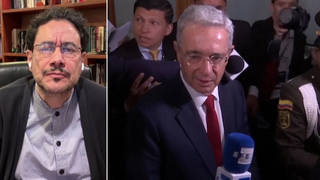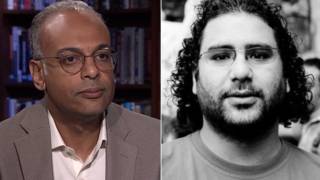
Ahmad Shokr, an editor at the Egyptian daily newspaper Al-Masry Al-Youm, files a report from Cairo on Saturday morning, day five of the largest anti-government protests in Egypt in decades.
RUSH TRANSCRIPT
AHMAD SHOKR: After a day of unprecedented mass rallies that brought hundreds of thousands to the streets across Egypt, the protesters on Saturday morning are renewing their calls for President Hosni Mubarak to step down. The government has imposed a curfew just after sunset, which was largely ignored. Of course, Cairo is a big city; almost there are 20 million people, and so it was virtually impossible to enforce a curfew in the state of upheaval that the city was in last night. Battles with riot police continued late into the night. But it now seems that the police have retreated, at least in Cairo, and there are still reports of violent clashes with security in Ismailia further east. But in Cairo, they seem to have retreated after being defeated by the protesters yesterday.
The death toll from yesterday’s protests has reached at least 50 people, and over 1,000 injuries have been reported. Military tanks and armored vehicles have been deployed onto the streets, mostly around key government sites and the National Museum, and they remain there as we speak. For the most part, the military has been friendly with the protesters, with soldiers saying that they’re there to protect the people, though there are some reports of protesters having torched military vehicles in different parts of the city.
There have been scenes of violence and looting last night, but the vast majority of it was directed at political symbols, such as the ruling party headquarters, which has been set ablaze, and numerous armored security vehicles that were taken over and turned over and burned and used as road blocks by the protesters. Most of the protesters have been very keen on protecting public property. Wandering through the streets last night, I saw several incidents where an individual who was attempting to damage public property, like buildings and statues and that sort of thing, was stopped by a crowd of people and warned against such actions, and where the crowd insisted that public property belonged to the people and not the regime and should not be the focus of the protesters’ attention.
Today there are popular committees on the streets that are guiding traffic. They’re cleaning the wreckage of security vehicles that were set ablaze and generally helping to maintain order. And the military seems to be helping them to do so.
Last night, President Hosni Mubarak finally gave a much-anticipated speech, where he announced that he would dissolve cabinet and pledged political and social reforms, and also congratulated his previous reforms for giving people the right to protest over the past few days, which are words which I’m sure infuriated many of those who were on the streets yesterday and in the previous days. Mubarak’s speech was followed by statements from U.S. President Barack Obama, who again emphasized the urgent need for reform in Egypt and urged restraint on the part of Egyptian security in dealing with protesters.
And I think the reaction to these speeches on the ground, particularly that of the Egyptian president, has been widespread disappointment and anger. Most people on the streets insist their demand is for the ouster of Hosni Mubarak and nothing less. In that respect, many feel that both Mubarak and Obama’s speeches have really missed the point. People are not out in the streets and have not been fighting off a violent security force for three days simply for a cabinet reshuffle or a change in the existing government’s policies. For them, it’s really about — it’s not about reforming the existing government; it’s about changing it. And that means, above all, Hosni Mubarak leaving power.
So, it’s now close to noon on Saturday in Cairo, and the new cabinet is expected to be announced very soon. And many people have already started to converge in Tahrir Square, the city’s main square, which I’m looking at right now, and many more are expected to fill the square throughout the course of the day to continue pressing forward with their demands for Mubarak to step down. So, while a relatively uneasy calm prevails over Cairo right now, the situation is still quite tense and can easily change throughout the course of the day.











Media Options